
by Steve | May 23, 2017 | Magazine, Magazine Articles, May-June 2017
Many things have changed regarding the United Methodist understanding of missions since Good News launched the Evangelical Missions Council (EMC) in 1974. During those years, the Rev. Paul Morell, senior pastor of the Tyler Street United Methodist Church in Dallas, gave strong leadership to Good News’ EMC ministry, serving many years as the chair of the EMC board. His commitment to missions was evident in Tyler Street’s “We Go” missions program, which helped scores of persons serve as missionaries in the field. Good News recognized Morell’s extraordinary commitment by establishing the Paul L. Morell United Methodist Missions Award in his honor shortly after his death. The inaugural award was presented posthumously to his wife, Ann.
In 1976, Good News invited the Rev. Virgil Maybray to become the Executive Secretary of the EMC. For nearly ten years, he travelled around the nation holding missions conferences in nearly 350 local United Methodist churches and raising more than $3 million in second-mile missions giving. This was the passion of EMC and Good News.
At the same time, EMC faithfully held dialogues to discuss ministry and theology with United Methodism’s missions bureaucracy. The talks proved to be fruitless, but the call to missions message was being spread.
In those dire times, The Mission Society for United Methodists was independently formed and christened in 1984. There was a definite need for a supplemental mission-sending agency in that era. The Mission Society began because of a widely perceived movement of the General Board of Global Ministries (GBGM) away from ministry that had a specific objective of helping people come to faith in Jesus Christ. Furthermore, there was a dramatic reduction in the number of missionaries being sent by the UM Church around the world.
In 1968, there were 1,650 missionaries serving outside the United States at the time of the Methodist and Evangelical United Brethren (EUB) merger. Unfortunately, by the early 1980s, the GBGM slashed its missionary ranks to slightly over 500. Those numbers eventually dropped even further.
Looking back several decades later, the politically-charged era of the times and the inflexible progressivism of the GBGM are different today. Nevertheless, the pain that took place many years ago over missions within our denomination is indisputable and authentic. As Good News celebrates 50 years of ministry within The United Methodist Church, we share the following adapted report on the debate over missions within our denomination by Dr. Riley B. Case, author of Evangelical & Methodist: A Popular History (Abingdon). – Good News
By Riley Case-
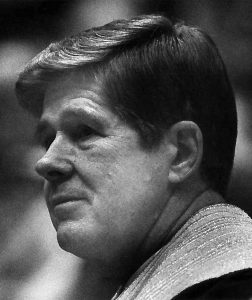
The Rev. Paul Morell
At the time of the emergence of Good News, Methodist seminaries were caught up in the radicalism of the age and began redefining words such as “salvation,” “commitment,” and “evangelism.” Professors began stressing that the kingdom of God was this-worldly and was related to political and economic justice. There was cynicism and sometimes outright hostility toward local churches rooted in the thinking of the past. The seminaries became centers of criticism for those who stressed a “personal” rather than a “social” gospel. In the ensuing controversies, traditional evangelism was often pitted against social justice. These controversies carried over to the missionary outreach of the Church. The Church, it was maintained, needed to send out new and different kinds of missionaries, if it sent out missionaries at all.
Good News’s major concerns about missions in the early days of the movement were directed primarily to the lack of fervor in the local church.
As the chair of the Good News board, Dr. Philip Hinerman, senior pastor of Park Avenue Church in Minneapolis, attended the annual Board of Missions meeting. “I heard or read not one word about the need to reach men who are forever lost without Jesus Christ,” wrote an astonished Hinerman in a 1972 Good News magazine article entitled “Missions Without Salvation.”
In the following issue, Dr. David Seamands, senior pastor of the Wilmore United Methodist Church in Kentucky, wrote “Missions Without Salvation, Part II.” Seamands, part of a well-known missionary family, had spent sixteen years in India, was a member of the Good News board, and had been noting with alarm the seismic ideological shifts in mainline mission philosophy. He wrote, “A new concept of mission which, as far as we evangelicals are concerned, violates the very premises of the Gospel as found in the Scriptures.” Seamands delineated the ideology that accompanied the new concept of “mission”:
• The new concept of mission sees no relevance in reaching the unevangelized. God is most active in the sociopolitical revolutionary movements of our time.
• Salvation no longer means God reconciling sinners to himself, but in the overcoming of economic and political evil powers.
• Christ is not the atoning Son of God, but the one who started the whole process of secularizing and humanizing world history.
What Hinerman and Seamands articulated helped make sense out of the uneasy feelings evangelicals were having about the missions direction of the denomination. Of special concern was the claim that it was specifically evangelicals who were not being accepted as missionaries and evangelicals on the field who were not being returned.
After a period of prayer and searching, Seamands invited 70 pastors and laypersons to meet for a missions consortium. The February 1974 retreat brought together a large, diverse group that agreed the historic Methodist missions legacy should not be given over to alien ideology. Those in attendance formed themselves into the Evangelical Missions Council (EMC), pledged themselves to the cause of missions, and agreed to seek conversations with the newly formed General Board of Global Ministries.
Unfortunately, the first meeting was not a hopeful start for those who believed dialogue would aid understanding and working together by an alienated constituency. EMC representatives were disturbed at what appeared to be either deliberate obfuscation to avoid having to answer the issues or total ignorance of the issues being raised by evangelicals, all in a climate of hostility and condescension. It seemed as if the board had shifted to the view that “evangelism,” at least as traditionally understood as winning persons to Jesus Christ, was, in fact, a hindrance to the real work of the Church.
For evangelicals, “dialogues” with the board served as a reality check. GBGM leaders did not see Good News or the Evangelical Missions Council or evangelicals as having any legitimate contribution to make to the task that GBGM had outlined for itself in the world.
A June 27, 1975, editorial in The United Methodist Reporter, entitled “EMC Agency Is Dangerous Precedent,” commented with some dismay about what it saw as a possible independent missions-sending agency sponsored by EMC. The issue, according to the editorial, was not evangelism versus social action, but constructive versus destructive methods of making a group’s voice heard in the Church.
Numbers of moderate United Methodists including several bishops, were alarmed at the actions of the GBGM but were more alarmed at the possibility of an independent agency. EMC itself, while seeking publicly to say positive things about the “dialogues,” was growing impatient.
In 1976, Virgil E. Maybray, pastor of First Church, Irwin, Pennsylvania, was invited to become EMC’s first full-time staff person. Virgil would spend the next eight years in a job he dearly loved, traveling through the country to speak of reaching the lost for Christ. Virgil’s task was not to be embroiled in the ideological controversies related to missions but to build positive support for evangelical missionaries and evangelical causes that were functioning within the board.
Castro or Wesley
United Methodist evangelicals were frustrated at this time that the UM mission agency had abandoned the traditionally understood view of evangelism and missions. Instead, it seemed to be enthralled with politics and revolution. This focus was illustrated by the article by Dow Kirkpatrick in the July 22, 1977, issue of The United Methodist Reporter, “Castro and Wesley.” Kirkpatrick had been a friend of the GBGM for years and was given missionary status with the board and traveled mostly to Latin America with the responsibility of “interpreting issues” to North American churches. Speaking out of his exhilarating experience of being in Cuba on May Day, Kirkpatrick commented:
“Fidel and his people celebrate the revolution they caused; we (Wesleyans) commemorate the ones we prevent. Cubans believe their lives are vastly better because of their revolution. Hunger, poverty, unemployment, racial discrimination and illiteracy have been eliminated. Quality health care is universal. Slums are being replaced by new housing. Dignity has been given to every human being.”
Kirkpatrick continued: “Wesley’s movement improved the lot of depressed 18th century England. Cuban Christian Marxists say, however, it failed because it was not radical. Like all gradualist proposals it left the roots of injustice untouched.
“We can learn what evangelism is from Cuba,” Kirkpatrick concluded. “Why is Marx believed more adequate than Wesley by millions of people today? … The Cuban Revolution – in contrast to the Christian Church, [Castro] believes – is one ‘that is with the poor’ and ‘he who condemns a revolution like this one betrays Christ.’”
Kirkpatrick went on to argue that the clearest statement of evangelism in Cuba had been by Sergio Arce, rector of the Evangelical Seminary in Matanzas, who was quoted as saying: “The first task of evangelism is to confront Christians who are not atheists of the head, but are atheists of the heart. Marx was an atheist of the head, but not of the heart.”
The September 9, 1977, issue of The United Methodist Reporter quoted Arce again as he elaborated on evangelism: “It is more important today to be a Marxist than a Christian.” Arce argued that Christianity and Marxism are interchangeable and he had no interest in converting Marxists to Christianity.
Jessup Report
While the Marxist critique of Wesleyan revival went over well in some quarters, there were many United Methodists that believed their tithes and offerings were supporting wrongheaded political radicalism, rather than biblical revival.
It was at this era that David Jessup, a United Methodist layman working for the AFL-CIO, was astonished when his children brought home appeals for wheat shipments to the Marxist government of Vietnam. His dogged research unearthed a 27-page paper identifying grants and involvements by United Methodist agencies to far-left organizations, fronts, and political groups with communist links and revolutionary intentions.
Jessup’s explosive report was published in the September/October 1980 issue of Good News. Instead of investigating the misappropriation of church funds to Marxist causes, church leaders questioned Jessup’s motives and spoke darkly of a “McCarthyite witch hunt.” The denominational condescending response included: “As change swirls around us, some persons cling to an understanding of history and the role of our nation that seems to be fading. Such persons are deeply troubled by the shifting of power they see in the world and are fearful….”
The irony, of course, is that the Jessup family had been active in the Peace Corps in Peru, as well as involved in the civil rights and farm worker movements in California. Jessup’s research had further discovered a denomination with an off-kilter political barometer: church pronouncements in support of Ayatollah Khomeini and the “students” holding hostages in Iran; further discussion on the Cuba Resource Center, the Nicaraguan Literacy Program, and the North American Congress on Latin America (and their monthly newsletter devoted to Che Guevarra), groups that had been monitored closely by the State Department of a Democratic administration.
“Because my report has been publicly attacked as a ‘McCarthyite witch hunt’ by several Church officials, it is necessary to repeat that I am not questioning the right of any group or individual to speak out and organize for any cause, no matter how offensive it may be,” said Jessup. “The only question is whether the majority of churchgoers wish to foot the bill for such causes.… After many years of past and continuing involvement in pro-labor, liberal and civil rights causes, I am more than ever convinced that there is nothing ‘reactionary’ about trying to redirect Church resources toward a more consistent support of democracy in all societies, left and right.”
In December 1982, Reader’s Digest carried the article, “Do You Know Where Your Church Offerings Go?” On January 23, 1983, the CBS program 60 Minutes aired the segment, “The Gospel According to Whom?” Both the article and the TV program were sparked by David Jessup’s research into how church funds were being spent. Time magazine reported on controversy in its March 28, 1983, issue under the heading “Warring Over Where Donations Go.”
Drifted Astray
In the May/June 1983 issue of Good News, associate editor James S. Robb published a 20-page cover story expose entitled “Missions Derailed,” a special exposé on the UM General Board of Global Ministries. “If anything appeared sure during six months of study, it was that the board’s program seems badly, even dangerously out of balance. It has become obvious that the board has diverted its resources on a massive scale away from traditional missions projects located ‘on all six continents’ and toward political programs centered at 475 Riverside Drive in New York – GBGM’s headquarters,” wrote Robb.
At this same time, the Rev. Dr. Ira Gallaway’s book, Drifted Astray, served as an additional insight into evangelical unease about the direction of United Methodist missions. As pastor of First United Methodist Church Peoria, Illinois, the largest church in the North Central Jurisdiction, the book was a call to be faithful to Methodism’s orthodox heritage. It was only after a hundred pages of affirming that which was good in the Church that Gallaway finally approached the issue of “covenant trust” and the “credibility gap” between the grassroots church and the leadership and programs of the national boards and agencies.
Gallaway continually reminded the reader that the gospel should not be identified with any one form of government or economic order. As the former head of the Board of Evangelism of The Methodist Church, he charged the mission agency with an unbalanced ideology, in which the evangelistic call to make disciples of Jesus Christ had been eclipsed by leftist political advocacy.
In that same year, 1983, Bishop Ole Borgen from Norway, who had been one of the bishops participating in the dialogue between the EMC and GBGM, gave an address at the Good News Convocation at Anderson, Indiana, entitled “One Mission – One Missional Purpose.” “‘Salvation’ no longer indicates the new relationship with God, but just as much any kind of ‘salvation’ within the socio-political realm,” he said. “We have almost imperceptibly moved to a position which, drawn to its uttermost consequence, will end up in a socially defined humanism where faith concepts are used, but where man himself is the acting and redeeming agent.”
Bishop Borgen’s presentation lifted up a number of concerns that had already been expressed in the EMC and GBGM dialogue. The purpose of “dialogue” supposedly was to increase understanding, resolve differences, and find common ground for mission. Members of the evangelical dialogue team after ten years of sessions were not experiencing understanding, resolution, or common ground. The GBGM team was still challenging the use of the term “evangelical,” questioning whether EMC really spoke for any legitimate constituency, and defending board policies and actions as a faithful fulfillment of the Discipline. To make matters worse, there was no way of discussing the issues outside the dialogue meetings since there was an agreement of confidentiality about the substance of the talks.
On November 28, 1983, thirty-four persons gathered in St. Louis at the invitation of Gallaway and Dr. Bill Thomas, pastor of First United Methodist Church, Tulsa, and covenanted to form a supplemental mission-sending agency within The United Methodist Church. Among those present was Dr. Gerald Anderson, director of the Overseas Ministry Study Center, editor of the International Bulletin of Missionary Research, and perhaps the foremost missiologist in the denomination. Dr. Anderson, just a month before, had presented a paper to a number of pastors in Dallas, Texas, entitled “Why We Need a Second Mission Agency.”
At the meeting in St. Louis, he commented: “[It is] difficult to discern that those who are now responsible really believe that it makes any difference whether or not one believes in Jesus Christ as Savior and Lord. Further, that their programs do not reflect this belief.”
The main precipitating factor that led the group to believe that evangelical concerns were being ignored was the selection of Peggy Billings as a mission agency leader. The selection had been made just prior to the November 1983 meeting. Evangelicals considered Billings’s appointment as an in-your-face put-down of everything that had been discussed in the dialogues. Billings was an assistant general secretary with the Women’s Division, responsible for Social Concerns, and an outspoken critic of traditional United Methodist doctrine and of traditional missionary efforts.
Billings, a former missionary to Korea, had published mission study material on Korea entitled Fire Beneath the Frost, to which the Korean Church (which it supposedly covered) reacted to with dismay and anger. The study promoted “Minjung theology” – a kind of liberation theology so obscure that most Korean Christians had never heard of it – made almost no mention of the explosive growth and evangelism of the Korean Methodists, and was highly critical of the Korean government and the Korean churches. She was also highly critical of the EMC, labeled it divisive, and used her influence to cut off support to overseas churches that sought help from EMC.
With the Billings appointment it was apparent that GBGM was not intending to take the evangelical concerns seriously. Thus, a new supplemental agency – The Mission Society for United Methodists – would be formed. Those present at the first meeting covenanted to raise the $130,000 that would be needed to launch the agency. Support and encouragement came from a number of quarters. H. T. Maclin, field representative for Mission Development in the Southeast jurisdiction, resigned his job with the Board of Global Ministries and became the first executive secretary.
The Mission Society was very careful in its organizing literature to affirm most of the work the GBGM was doing. It would seek to act not in competition with, but alongside the official mission board. It would in no way seek to divert apportionment money or advance money from the GBGM. It would enter no area without a specific invitation of the bishop and the national church.
The Good News board rejoiced at the news of the new society. It voted immediately to disband the Evangelical Missions Council so that the Council could integrate itself fully with the new society. It released Virgil Maybray from his staff responsibilities with Good News so that he could work with H. T. Maclin in the Mission Society.
Not all in the UM Church, however, were pleased. Within a few months, the 1984 General Conference would be meeting in Baltimore, and the Mission Society would be an issue. Some wished to make the Mission Society “official.” Key leaders of the Mission Society were cool to the idea. “Official” would carry with it restrictions, political compromise, and bureaucratic entanglements, the very thing the society wished to avoid. Others at the General Conference desired an expression of condemnation. The conference finally passed a statement affirming the general board as the only “official” sending agency in the UM Church but also adding this statement: “In fairness to the concerns of those who feel the necessity for a second agency, we urge that measures be taken to assure our people that evangelization and evangelism are a vital part of the philosophy and practice by the Board and its staff is committed to Wesleyan theology.”
The General Conference also directed that directors and staff persons of the GBGM confer with directors and staff persons of the Mission Society to enhance the witness of Jesus Christ. Bishops were asked to serve as mediators in the discussion of mission philosophy. The “dialogue” that had begun between the General Board of Global Ministries and the Evangelical Missions Council would continue.
When the date was set, May 7, 1985, at Highland Park Church, Dallas, for the commissioning of the first missionaries from the Mission Society, Bishop James Thomas, president of the Council of Bishops, made arrangement with three other bishops to be present and participate in the commissioning service. It was customary to participate in such commissioning when United Methodist missionaries were being sent to do United Methodist work.
However, strong voices in the Council of Bishops, who wished to use the power of the institution against the society, prevailed against Thomas and made him renege on his promise.
This action of withholding the blessing of the bishops was followed by the bishops’ resolve not to give extension appointments to any clergy who would seek service with the Mission Society. In light of the practice of giving extension appointments to almost everyone who asked, even to agencies that had no contact with the Church, the action could only be seen as punitive and was a reminder of other actions taken by bishops and the Church against those who sought to serve Christ apart from “official” structures. The message of GBGM and the bishops to churches was plain: Do not support United Methodist efforts to win persons to Jesus Christ unless properly authorized by the “official” agencies.
In early 1988, the “dialogue sessions” between the Board of Global Ministries and the Mission Society mandated by the 1984 General Conference broke down and ended. The board had insisted that the meetings be closed and secret. When members of the United Methodist press pointed out that this was in violation of the Discipline, and members of the Mission Society refused to continue banning the press, the bishops simply canceled the meeting and the whole dialogue. It appeared to a number of observers that the bishops thought it more expedient to violate the General Conference mandate than to make public the discussions.
Ten years of efforts to find common ground had brought more alienation rather than reconciliation among the board and the EMC and then the Mission Society. However, the dire predictions of those who prophesied divisiveness, lack of support for the General Board, conflict on the mission field, and a loss of connectedness if the Mission Society were allowed to exist, never came to pass.
The Mission Society for United Methodists served as a good outlet for those who wished to support United Methodist missions work (rather than other independent agencies) that they could trust would operate with evangelical integrity.
Riley B. Case is the author of Evangelical & Methodist: A Popular History (Abingdon). He is a retired United Methodist clergy person from the Indiana Annual Conference, the associate director of the Confessing Movement, and a lifetime member of the Good News Board of Directors. This essay is adapted with permission from Evangelical & Methodist.
Editor’s postscript: Over a long and strenuous period of time, the UM Church has been able to accept the ministry of The Mission Society (now known as TMS Global). The 2008 General Conference actually passed a resolution affirming the work of The Mission Society and encouraging the GBGM to “develop new conversations and liaisons with the Mission Society for new and ongoing partnerships in areas of mutual concern.” In 2009, for the first time, GBGM and The Mission Society jointly sponsored a missions conference (with other organizations).
In 2012, the Rev. Dick McClain led a Bible study at a GBGM meeting. That incident was newsworthy because McClain was President of the Mission Society, a clergy person who for eight years had to go on Leave of Absence because his bishop would not give him an extension appointment to the Mission Society. (That, too, has changed.)
McClain’s presence at the GBGM followed the presence of Dr. Thomas Kemper, General Secretary of GBGM, at the Mission Society’s board meeting in preceding year. “It might seem like mission impossible bringing together two long-estranged mission organizations,” wrote Sam Hodges for The United Methodist Reporter. “But in the last few weeks, there’s been dramatic evidence of improved relations between the UMC’s General Board of Global Ministries and the Mission Society….”
“The Kingdom is much more than one organization and one understanding of the Kingdom,” Kemper told the Mission Society board. “Missions don’t rely on our means, and not even on our gifts, or even on our wealth. We think it’s all about money, but it’s about people, giving of ourselves,” Kemper said. As Christ sends his people into the harvest, which Jesus describes as “plentiful,” he said, “Let us work together so that the Kingdom of God is right at the doorsteps of people we meet and serve.”
In 2016, GBGM completed the move of its headquarters and staff to Atlanta, just a few miles from the home offices of TMS Global. The Rev. Max Wilkins, current President and CEO of TMS Global, says, “We welcome GBGM to Atlanta. The close proximity of our offices affords ever greater opportunities for honest conversation and cooperation in the multiple areas of Kingdom ministry that our two distinct missions have in common. It is a new day, and Dr. Kemper and I continue to meet together regularly and collegially as we seek to join Jesus in His mission around the world in the Wesleyan spirit.” Ω

by Steve | May 23, 2017 | Magazine, Magazine Articles, May-June 2017

The family of JT Olsen (second from left, top row), including his adopted daughter Gracie (center, bottom row). Photo: Both Hands.
By Courtney Lott-
What would you spend your entire life savings on? Would you buy a house? That car you always wanted? The flow of our money generally reveals where our hearts, our passions, our desires lie. It’s an easy thing to hold onto, like a security blanket, or to toss around with gravitas like a lotto winner. For JT Olson, founder of Both Hands, a faith-based nonprofit that serves orphans and widows, a life savings was something that could be used to save a life.
One of five children, Olson grew up on a small farm in Harper’s Ferry, Iowa. Together with his parents and paternal uncle, the family farmed 380 acres of what he describes as some of the most beautiful land in the entire state. Eight people in a 1,500 square foot home might have been tight, the hours baling hay long, and a half-mile trek to the bus stop (uphill and in the snow) grueling, but Olson also remembers having a lot of fun. Not many children can claim to be allowed to drive before having a driver’s license after all, even if it was just an Oliver tractor.
Then, at the age of twelve, everything changed. On the way back home from celebrating their 16th wedding anniversary, Olson’s parents were killed in a car accident. When his brother told him the news, he simply remembers hitting the floor and crying. “You just don’t realize how much a mom and dad stabilize you,” said Olson. “It’s just one of those things you kind of count on. I know what it’s like to be an orphan, to hear those words ‘mom and dad are dead.’ To wonder what’s going to happen to us, who’s going to take care of us, or where we’re all going to go.”
Fortunately for Olson, three months before the accident his parents had made plans for their children in case anything happened. Therefore, when tragedy hit, the five siblings found a new home with their aunt and uncle, but not before the community gathered around them to help with the farm. “I remember [getting] off the bus … and there were all our neighbors in our fields with their tractors and their plows and their planters and they were planting our crops,” Olson says. “It was like all my dad’s friends were taking care of us. And I realized, this is what you do.”

Jonathan and Amy Whitt and their adopted daughter, Emery.
That sense of community established a desire in Olson to do the same for others caught up in the midst of tragedy. While working with college students for The Southwestern Company, he witnessed how an organization called Bethany Christian Services served young women in difficult situations. When one of his students became pregnant out of wedlock, the Olsons invited her into their home and Bethany came alongside her.
“What I saw, while she was pregnant, was the way Bethany Christian Services came in and ministered to her, helped her figure it out, helped her figure out what to do, and just loved on her,” says Olson. “It’s just a great organization and they didn’t charge her a thing. So when I left Southwestern, I said if I’m going to give my life away in a volunteer position it’s going to be with Bethany.”
During his work with Bethany, Olson participated in a number of fundraisers – such as golf tournaments – to drum up support for the ministry. It wasn’t until a friend refused to donate because he was “simply golfing,” however, that he realized there might be a better way. “He took a magic marker and scribbled on my letter: ‘JT if you told me you were working on a widow’s house I might have sponsored you, but you’re just golfing’,” Olson says. “’Nice cause, but not my money.’”
This got Olson thinking, but it took hearing a friend’s adoption story to convince him to act. About three years later, a man from church named Don told him he planned to adopt four kids from Moldova, an Eastern European country and former Soviet republic, and that it would probably cost around $65,000. It was this that spurred Olson on to organize what would later become the Both Hands ministry.
In order to raise money for the adoption, Olson and more than a dozen other men mailed letters to everyone they knew asking for people to sponsor them while they worked on the home of Ms. Lucile, a widow. The donations to fix the house rolled in. “Local merchants and individuals who loved what we were doing asked how they could help,” recalled Olson. “The only thing we spent money on was stamps. We ended up raising $72,000.”

Ms. Debbie served by a Both Hands project in 2016.
This success led to more opportunities to help widows and orphans. “We started our organization in August of ‘08 and since that time we’ve done 652 projects in 42 states,” Olson says. “723 widows have been served. 793 kids are no longer orphans. And we’ve raised $7.5 million for families for adoption. And of that $7.5 million we haven’t taken anything out for our expenses. I set it up that way. We don’t take anything out. Whenever there’s a project we take out a grant.”
One of these orphans includes the Olson’s daughter, Grace. In spite of his passion for adoption, Olson was initially hesitant to do so himself. Though financially comfortable, they did have four kids of their own and had only their life savings to live on. Then, one Christmas eve, Olson had a revelation in their attic.
“All I see is car seats, strollers, cribs, and I just thought to myself, ‘We’ve got everything we need, what’s wrong with using a life savings to save a life?’,” Olson says. “And that was my watershed moment in my life that made me realizes what’s important. What burns and what doesn’t burn.”
By the next July, they received a referral for a girl from China who they planned to name Gracie. Later on they found out that Grace was, in fact, the name an orphan worker had decided to call the little girl who’d been left on their doorstep. Now, whenever people ask why they went to China for their daughter, Olson says that this was where Grace was.
Courtney Lott is the editorial assistant at Good News.

by Steve | May 22, 2017 | Magazine, Magazine Articles, May-June 2017

Dr. Thomas C. Oden (1931-2016)
By James V. Heidinger II-
We can learn much from the remarkable theological journey of the late Professor Thomas C. Oden, who taught for more than 30 years as a professor of theology and ethics at the theology school at Drew University. Dr. Oden, a longtime colleague in denominational renewal, was a courageous, loyal United Methodist who loved the church. He was a theologian without peer within United Methodism. He was also highly respected in Protestant, Catholic, and orthodox communions as well as numerous evangelical denominations. He authored more than 20 books, including a three-volume Systematic Theology. He was also the general editor of the acclaimed Ancient Christian Commentary on Scripture series, a 27-volume work published by lnterVarsity Press. The importance of his contribution cannot be overstated.
“I left seminary having learned to treat scripture selectively, according to how well it might serve my political idealism,” he wrote in The Rebirth of Orthodoxy. “I adapted the Bible to my ideology – an ideology of social and political change largely shaped by soft Marxist premises about history and a romanticized vision of the emerging power and virtue of the underclass.” This ideology led him to involvement in numerous trendy movements, such as the United World Federalists promoting world government, liberalized abortion, the demythologizing movement (about which he did his PhD dissertation), transactional analysis, parapsychology, biorhythm charts, tarot cards, and the list goes on. Oden looked back on those years with some amusement at his obsession with such trends, and admitted that he felt he was doing Christian teaching a marvelous favor by it and even considered this accommodation the very substance of the Christian teaching office.
He wrote, “For years I tried to read the New Testament entirely without the premises of incarnation and resurrection – something that is very hard to do.” He assumed that truth in religion “would be finally reducible to economics (with Marx), or psychosexual factors (with Freud), or power dynamics (with Nietzsche).” He confessed “I was uncritically accommodating to the very modernity that pretended to be prophetic, yet I did not recognize modernity’s captivity to secular humanistic assumptions.” During those years, Oden acknowledged, “I never dreamed that I would someday grant to scripture its own distinctive premises: divine sovereignty, revelation, incarnation, resurrection, and final judgment.” Reading those words, one is struck that they described, as we have seen earlier, the very premises that were essentially put aside during the heyday of theological liberalism. They were rejected because they assume the reality of the supernatural and the miraculous.
Oden went on to say, “I had been taught that these premises were precisely what had to be transcended, reworded, circumvented, and danced around in order to communicate with the modern mind.” Frankly, this is the kind of theological ballet many evangelicals have watched for decades as liberal pastors and theologians have often “wrongly handled the word of truth” (to paraphrase Saint Paul), dancing and circumventing and rewording the plain meaning of the biblical text. The phrase Oden used is haunting as one reflects upon it. He wrote, “I had been taught.” But taught what, exactly? Well, in his words, taught that the premises of divine sovereignty, revelation, incarnation, resurrection, and final judgment had to be “transcended, reworded, circumvented, and danced around.” He was taught that these premises or theological convictions could no longer be valid in a new era of enlightenment. These were premises we must somehow improve upon. Yes, Oden had been taught, by sincere and no doubt well-meaning professors. One wonders how many seminarians have had such theological instruction in their preparation for ministry but never came back home to reaffirm the integrity and intellectual credibility of apostolic Christianity.
Thankfully, Thomas Oden came back home. He had a major theological reversal, as he described it. He celebrated the grace of God at work in his bizarre journey. He wrote, “Now I revel in the very premises I once carefully learned to set aside: the triune mystery, the preexistent Logos, the radical depth of sin passing through the generations, the risen Lord, the grace of baptism.” Let’s admit the obvious here: when you set aside these major themes of Christian doctrine, what remains of the historic Christian faith? There was a commendable honesty in Oden’s admission. He didn’t claim that he was simply reinterpreting those themes. He admitted these were themes he had learned “to set aside.”
What was it, then, that brought about this remarkable reversal in Oden’s life and theology? Hear this brief portion in his own words: “What changed the course of my life? A simple reversal that hung on a single pivot: attentiveness to the text of scripture, especially as viewed by its early consensual interpreters.” Most laity would be perplexed that a theologian might not give great attentiveness to the text of Scripture. That seems so basic to the ministerial vocation. But again, it “reflects how Scripture was, and is, perceived in the liberal/modern perspective. Oden wrote, “Before my reversal, all of my questions about theology and the modern world had been premised on key value assumptions of modern [liberal] consciousness – assumptions such as absolute moral relativism. After meeting new friends in the writings of antiquity, I had a new grounding for those questions.”
Before his reversal, Oden “distrusted even the faint smell of Orthodoxy. I was in love with heresy – the wilder, the more seductive,” he wrote. “Now I have come to trust the very consensus I once dismissed and distrusted. Generations of double-checking confirm it as a reliable body of scriptural interpretation. I now relish studying the diverse rainbow of orthodox voices from varied cultures spanning all continents over two thousand years.”

Professor Thomas C. Oden
One smiles, but with thanksgiving, at this former movement theologian writing of his newly found commitment to “unoriginality.” He insisted, “That is not a joke but a solemn pledge. I am trying to curb any pretense at ‘improving’ upon the apostles and fathers.” Acknowledging the “deceptiveness of originality,” he went on to write, “I can now listen intently to those who attest a well-grounded tradition of general consent rather than a narrow contemporary bias. I listen to voices that echo what has been affirmed by the community of saints of all times and places.”
In his autobiography, A Change of Heart, he described it as a “cycle of learning, unlearning and relearning.” This was reflected in “my joyful reception, then in my sophisticated rejection, then later in my embracing the hymns of my childhood.” At first he believed naively that God had come in the flesh. Then he learned that God had not really come in the flesh “but rather in some symbolic sense acceptable to modern assumptions.” Then, “At last I learned to recover the uncomplicated truth that God precisely becomes human in the flesh, dies for me, rises again and saves me from my sins. All these are viewed by consensual Christianity as historical events.”
It should come as no surprise that a theologian who spent his professional life in the world of theological education would write a book that addressed the problems of modern-day seminary education. Oden did so, though regretfully he admitted, as he loves the United Methodist Church and he loved the school of theology at Drew, where he spent so much of his professional teaching career.
In Requiem, he critiqued the failure of contemporary theological education and called for a return to classical Christian theology. He could have chosen to just gloss over the current ailment in the seminary world, he admitted, but “not with a healthy conscience.” While confessing that he is a “conflict-avoiding peace lover,” he wrote these sober and troubling words: “So after a lifetime of teaching … I am very nearly convinced that the present system is practically irreformable. This I say sadly, not irately.” He lamented the seminaries being “tradition-deprived,” and wrote about an academic tenure system that is “fixed in stone.” He also noted the academic distrust of the parish. In fact, “brilliant academics with no experience whatever in the actual practice of the ministry of Word, Sacrament, and pastoral care are often those who compete best in the race to become teachers of ministers in the trendy, fad-impaired seminary.” He noted sadly that having parish experience is more likely to be a negative factor than a positive one when seeking a teaching position in the seminary today.
Oden also cited the triumph of latitudinarianism, that is, a complete tolerance of all doctrinal views. The result is the complete absence of heresy. He wrote frankly that “heresy simply does not exist.” This is something never before achieved in Christian history, he observed. But the “liberated seminary” has finally “found a way of overcoming heterodoxy [departure from traditional doctrine] altogether, by banishing it as a concept legitimately teachable within the hallowed walls of the inclusive multicultural, doctrinally experimental institution.” The only heresy one might possibly encounter, said Oden, is an offense against inclusivism. One might add another – the failure to use politically correct language for God. (This, perhaps, would be considered a part of inclusivism.)
In the late 1970s, studies reported the sobering news that United Methodism’s seminaries were failing. There was a high dropout rate among young clergy, both male and female. In addition, there was an increasing struggle for student registration and tuition. Oden suggested at the time that if his seminary would only appoint a few new faculty who could connect with evangelical students, it would help solve that problem. Unfortunately, the new faculty appointments were “all in the opposite direction,” Oden wrote in A Change of Heart. “Most new appointments were made to left-leaning scholars who were dedicated to their ideologies and who either ignored, loathed or demeaned evangelicals.”
The day of ignoring what is happening in our denominational seminaries is over, according to Professor Oden. In a word of warning in Requiem, he wrote, “Christian worshipers can no longer afford to neglect what is happening to the young people they guilelessly send off to seminary, entrusting that they will be taught all that is requisite for Christian ministry.” He concluded with a sober but very timely warning to the church about seminaries that have clearly lost their way theologically: “When the liberated have virtually no immune system against heresy, no defense whatever against perfidious [treacherous, breaking of trust] teaching, no criteria for testing the legitimacy of counterfeit theological currency, it is time for laity to learn about theological education.”
Professors often justify teaching anything they want to teach by appealing to academic freedom, but Oden was not so ready to let them off the hook on that. He wrote, “If the liberated have the freedom to teach apostasy, the believing church has the freedom to withhold its consent.” He made the case even stronger: “If they reach counter-canonical doctrines and conjectures inimical to the health of the church, the church has no indelible moral obligation to give them support or to bless their follies.”
Oden affirmed that as a former sixties radical and now an out-of-the-closet orthodox evangelical, he shared concerns with a new generation of young classic Christian men and women who affirmed the faith of the apostles and martyrs. He found himself “ironically entering into a kind of resistance movement in relation to my own generation of relativists, who have botched things up pretty absolutely.” We must not miss the sobering implications of what he said – that he as an “orthodox evangelical” saw himself as being part of “a kind of resistance movement” in today’s church. He would assure us that this was not fantasy or hyperbole or some messianic obsession. He engaged the church theologically for more than four decades and his words are a sobering critique, perhaps an indictment, of the theological setting in contemporary United Methodism: to be an “orthodox evangelical” is to be part of a “resistance movement.” Many evangelical seminarians would understand that sentiment from their own personal seminary experience.
James V. Heidinger II is the publisher and president emeritus of Good News. A clergy member of the East Ohio Annual Conference, he led Good News for 28 years until his retirement in 2009. Dr. Heidinger is the author of several books, including the recently published The Rise of Theological Liberalism and the Decline of American Methodism (Seedbed). This essay is excerpted from that volume with permission.
![A Peek Behind the Curtain]()
by Steve | May 22, 2017 | Magazine, Magazine Articles, May-June 2017
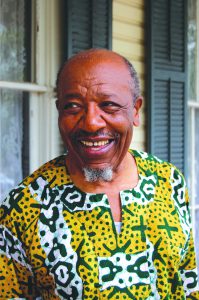
Civil rights leader John M. Perkins, founder and President Emeritus of the John and Vera Mae Perkins Foundation-Jackson, MS. Photo courtesy of Voice of Calvary.
By Courtney Lott-
“I looked, and behold, a great multitude which no one could count, from every nation and all tribes and peoples and tongues, standing before the throne and before the Lamb, clothed in white robes, and palm branches were in their hands; and they cry out with a loud voice, saying, ‘Salvation to our God who sits on the throne, and to the Lamb.’” (Revelation 7:9-10 NASB)
In John’s vision of the kingdom of God we are presented with a very diverse picture of its citizens. The worshippers come from every race, every language, every nation. Far from monochromatic, the kingdom of Heaven is an undoing of Babel, a breaking of barriers, the unification of Christ’s body. But when we look at our churches today, at our congregations, what do we see? Though in many ways the church has taken great strides against racism, the after effects of old structures and mindsets remain like fingerprints on a mirror. As Christians, we are called to take a sober look at these things. Racial reconciliation is hard, but thankfully, many have undertaken to aid the church in this difficult journey. The following books are helpful perspectives for this conversation. Each voice is different and offers its own unique angle.
Holding Up Your Corner
For situations fraught with sensitivity, practical guidance is essential. In Holding up Your Corner, the Rev. F. Willis Johnson, a United Methodist pastor, provides wisdom and insight. Offering helpful definitions and sober advice that is practical rather than preachy, this book equips leaders and readers to approach racial reconciliation with grace. Through his accounts of the racial strife in Ferguson, Missouri, and similar events, Johnson gives his audience the unique experience of seeing the world through his eyes.
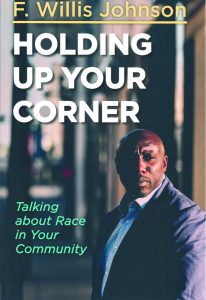
“Once we have acknowledged someone’s humanity, we can move on to affirmation – respecting their humanity,” Johnson writes. “Hear this: affirmation is neither an act of complicity nor condemnation. Affirming someone’s experience – their humanity in their own experience – does not mean you approve their ideology or behavior. We can love people without agreeing with them. That bears repeating: we can love people without agreeing with them. In the words of Howard Thurman, ‘Hatred does not empower, it decays. Only through self-love and love for one another can God’s justice prevail.’ In short, affirmation is a willingness to emphasize our interdependence and commonality over our difference.”
Holding up Your Corner is carefully rooted in the scriptural idea of balancing both justice and mercy, truth and grace, the practical and prophetic. It reaches out with gentleness and humility that challenges the reader in such a way as to promote conversation rather than dampen it. Johnson’s humble way of engaging his audience invites engagement rather than shutting it down. This book is a desperately needed guide through the difficult terrain that the church now faces in regard to loving the “other.”
Unashamed
Unashamed, the autobiography of mega-star Christian rapper, Lecrae, holds as its central concept the need for acceptance. From the first page, the writing conveys the painful sting of rejection. The reader can’t help but wince through the author’s childhood abandonment issues and heartache, then rejoice at the acceptance found in Christ. Yet Lecrae offers a starkly honest picture of his conversion and doesn’t shy from sharing his struggles with sanctification.
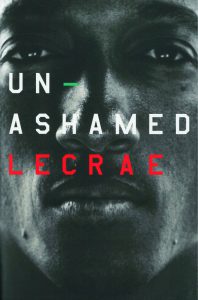 As a poetic artist, Lecrae makes a distinction between a “Pastor Rapper” and that of a “lamenter” – a passionate expression of grief or sorrow that is an outgrowth of his youth and the abandonment he felt. When he was free from trying to preach like a “Pastor Rapper,” Lecrae felt the words and rhythms flow when he allowed himself to be vulnerable and honest about his own battles.
As a poetic artist, Lecrae makes a distinction between a “Pastor Rapper” and that of a “lamenter” – a passionate expression of grief or sorrow that is an outgrowth of his youth and the abandonment he felt. When he was free from trying to preach like a “Pastor Rapper,” Lecrae felt the words and rhythms flow when he allowed himself to be vulnerable and honest about his own battles.
Lecrae describes his unique position within the industry and how it provides him with the opportunity to reach people others might not be able to. He writes: “Operating as a ‘Pastor Rapper’ was hard work for me because it wasn’t playing to my strengths. Rather than letting the music pour out of me when the inspiration came, I would spend hours studying beforehand … Being theologically educated is a great thing. And using music to explicitly express theology is needed. But I mistakenly believed it was the only way to make music. On the rare occasion, however, I would let go and let the ‘lamenter’ in me come out. When I did – when I let Lecrae just be Lecrae – it would spark magic… Rather than make myself the winner, I allowed myself to be the loser… People wrote to say how much that song impacted them because it was real and vulnerable. And this was one of the first moments I began to wonder if maybe God was calling me to make a shift in my music and begin producing new songs that were truer to how I was naturally made.”
Who Lynched Willie Earle?
Centered around a specific event, Who Lynched Willie Earle approaches the issue of race from a historical standpoint. Bishop Will Willimon creatively reimagines Pastor Hawley Lynn’s thought process leading up to his sermon condemning the lynching of a black man accused, but not convicted, of murder. Pastor Lynn confronted his own congregation with the mindset he believed led to the lynching, the deeply ingrained attitudes that allowed the mob to pervert “democratic justice” and execute Willie Earle.
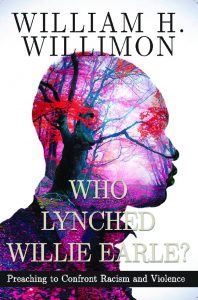
Willimon, prolific author and retired United Methodist bishop, proceeds to analyze the sermon. Not only does he take into consideration the history of America, but also connects this with Israel, the Gentiles, and the kingdom of God. Willimon also points out Pastor Hawley’s own blind spots, in which he failed to address systemic, institutional racism. In this, Willimon says, the church was able to “disassociate themselves from the sin and to bolster their confidence in Jim Crow.” In spite of his failings, Willimon calls Pastor Hawley’s sermon “heroic homiletics”.
“Though these sociological and historical facts about racism are significant, race is a specifically Christian problem because of the God we are attempting to worship and to obey,” Willimon writes. “In the gospel, we are given the means to be color-courageous, to talk about matters our culture would rather keep silent. That you have persevered this far in this book suggests you are exercising a bravery that is not self-derived. Paul says that, in God’s realm, Jews and Greeks, slave and free, ‘You all are one in Jesus Christ’ (Galatians 3:28). It is a baptismal call, not for color-blindness or arguing that gender or race are inconsequential, but rather a theological affirmation that Jesus Christ enables a new eschatological community where conventional, worldly signifiers don’t mean what they meant in the kingdoms of this world.”
Dream with Me: Race, Love, and the Struggle We Must Win
Like Unashamed, Dr. John Perkins’ approach is extremely personal and humble. In spite of this, he does not shy away from calling out injustice and racism. Quoting Frederick Douglas and sighting the stark reality of his own experience with segregation, Perkins focuses on the “walls that have kept black people and white people apart, even in places where we had so much in common.”
 “Anyone who knows my story would expect this book to ooze with justice issues. After all, the pain caused by injustice has motivated me to spend a lifetime working for social change on behalf of widows, prisoners, the poor, and anyone who struggles,” writes Perkins, the civil rights veteran who has led the Voice of Calvary Ministries in Jackson, Mississippi, since 1975. “So how did someone who has experienced the anguish of poverty, racism, and oppression end up wanting to write a book about love as his climactic message? Good question… I’ve come to understand that true justice is wrapped up in love. God loves justice and wants His people to seek justice (Psalms 11 and Micah 6:8). But I’ve come to understand that true justice is wrapped up in love. The old-time preacher and prophet A.W. Tozer had a way of making the most profound truths simple and palatable. He once said, ‘God is love, and just as God is love, God is justice.’ That’s it! God’s love and justice come together in the redemptive work of Jesus Christ, and we can’t be about one and not the other. They’re inextricably connected.”
“Anyone who knows my story would expect this book to ooze with justice issues. After all, the pain caused by injustice has motivated me to spend a lifetime working for social change on behalf of widows, prisoners, the poor, and anyone who struggles,” writes Perkins, the civil rights veteran who has led the Voice of Calvary Ministries in Jackson, Mississippi, since 1975. “So how did someone who has experienced the anguish of poverty, racism, and oppression end up wanting to write a book about love as his climactic message? Good question… I’ve come to understand that true justice is wrapped up in love. God loves justice and wants His people to seek justice (Psalms 11 and Micah 6:8). But I’ve come to understand that true justice is wrapped up in love. The old-time preacher and prophet A.W. Tozer had a way of making the most profound truths simple and palatable. He once said, ‘God is love, and just as God is love, God is justice.’ That’s it! God’s love and justice come together in the redemptive work of Jesus Christ, and we can’t be about one and not the other. They’re inextricably connected.”
Perkins takes a strong look at motivation. By keeping in mind questions about his own choices, he tempers his assessment with a great deal of grace and mercy. Perkins challenges parents to be mindful of the way that education choices may have a positive or negative effect on black children in public schools. Additionally, he asserts that integrating our churches is at the very heart of the gospel, the very heart of 2 Corinthians 5:19.
If we want to work toward racial reconciliation in a country that desperately needs it, if we desire to share the love of Christ with all nations, we must take steps to build empathy for our brothers and sisters. The books on this list are testimonies, a mere peek behind the curtain, but they may also serve as first steps. Ultimately, God alone through Jesus Christ can accomplish this. Racism, comparison, pride, arrogance, greed all root deep down in the hearts of man. But thanks be to God that he does not leave us in this sad state!
Courtney Lott is the editorial assistant at Good News.

by Steve | May 22, 2017 | Magazine, Magazine Articles, May-June 2017

Photo courtesy of Compassion International.
By Shannon Vowell-
Did you know that Methodism has been in India for a long time? I didn’t. For me – for many – the Methodist Church and the country of India intersect only in the work of the illustrious E. Stanley Jones, 20th century Methodist missionary giant and friend of Gandhi. But Jones’s seminal work, Christ of the Indian Road, was written 69 years after the first emissaries from the Methodist Episcopal Church in America arrived in the then-state of Oudh.
Not only has Methodism been in India 161 years, Methodism maintains a prominent place in the Indian pantheon of faiths. The autonomous Methodist Church of India has 12 regional conferences under 6 Episcopal areas. Total membership for the MCI and the Churches of North and South India (members of the World Methodist Council) approaches 5,648,000. (To put that in perspective, total membership for the UMC in the U.S. in 2015 was 7,067,162.)
This historic and ongoing connection is one of several compelling reasons why United Methodists should take note of recent events in India. What has happened to Christian ministries there matters to us, because we share with them the purpose of “making disciples of Jesus Christ for the transformation of the world.” Further, what happens next may depend on us, because ever-fewer disciple-makers remain in place.

Photo courtesy of Compassion International.
On March 15, 2017, Compassion International – the Christian global ministry giant specializing in serving vulnerable children– ended 50 years of Indian ministry. Nearly 150,000 children who had had access to food, clean water, medical care, education, and the encouragement of foreign sponsors and local community centers, lost access to all of the above in the space of a day.
Why? Well, we’ll start with the politically correct, official, version of what happened.
American politicians bemoaned a mysterious inability on the part of Compassion and the Indian government to identify and agree on a mutually acceptable compromise regarding regulation and tariff laws. Legal representatives for Compassion pointed to egregious misapplication of Indian laws on the part of the Indian government.
In reality, Compassion is the largest of hundreds of charitable (mostly Christian) non-government organizations (NGOs) being systematically ousted from India, because the prevailing worldview of the most recently elected regime there has influenced the way the law is applied. The issue is not whether Compassion violated or failed to compromise on some obscure regulatory code embedded in Indian tax law. Nor is it that the Indian government misinterpreted its own laws for financial gain. Rather, the issue is that a Hindu Nationalist regime cannot be true to its own principles while accommodating foreign operatives who have overtly Christian motives.
Stating these truths – politically incorrect as they are – has to be our first step in identifying what challenges may lie ahead for Methodist brothers and sisters who remain in place in India.
Next steps include cultivating a basic understanding of the ways Hinduism and Christianity are mutually exclusive. For example, the caste system. Officially extinct but actually in full force and effect, especially in rural areas among the poorest poor, this system categorizes Indian citizens into spiritual social tiers, between which there is no movement. The tiers and one’s place in them, are fixed and connected to the Hindu doctrine of karma. Karma explains a person’s life station and suffering as part of the cycle of existence; repeated reincarnations allow a human soul to make reparations for past sins in past lives. Progress can occur with each rebirth of the soul, as good works accrue and past sins are expiated. This progress leads the soul toward transcendence – moksha.
For a Hindu, serving the poor and marginalized can be personally expedient, because good deeds build good karma for oneself; this in turn accelerates progress toward moksha. But at the same time, one must not interfere with the karma of those being served. Within Hinduism, to artificially elevate someone to a different life station is to condemn them to further incarnations in which penance is required – delaying moksha and actually prolonging suffering. Politically incorrect to acknowledge, but nevertheless true: Karma provides justification for non-interference in the cycle of suffering – and karma labels indifference to the desperately poor a moral good.
By contrast, the Christian doctrine of reconciliation to God and equality in the eyes of God requires Christians to embrace and serve the poor as family, literally! Jesus gathered in the marginalized and comforted the forsaken, so Christians must do likewise. Historically, Methodists have applied this doctrine of reconciliation by founding and funding institutions whose very purpose is the interruption (and abnegation!) of the cycle of suffering: orphanages, schools, soup kitchens, hospitals, ministries of healing and help.
We United Methodists share the Indian dilemma faced by Compassion and ministries like it. Looking at a country where an estimated majority of the world’s poorest poor live, our Christian work appears urgently relevant and necessary. But the government which can give or withhold access to its needy population literally sees things differently.

Photo courtesy of Compassion International.
Hinduism protects the status quo as just and right within karma, and understands the alleviation of suffering as more harmful than the suffering itself. Christians challenge the status quo as part of the call to transform the world in Jesus’s name. Such deep contradictions in basic understandings of human worth, life purpose, and duty to fellow man must be acknowledged, no matter how politically incorrect such acknowledgement feels. To do otherwise – to “explain away” the situation in India as some petty money matter – makes a mockery of both Hindu and Christian belief systems.
The world of diplomacy often treats belief systems as side issues. But the inconvenient fact is that governments legislate based on systems of belief. These belief systems are not interchangeable. Indeed, they are often mutually exclusive.
Rather than capitulate to the stalemate of the world’s status quo, Christians must stand firm on the faith that puts the world in its proper perspective. We serve a God who is neither constrained nor confused by the idiocies of political correctness!
John Wesley’s example of persistent, faithfully offensive shrugging off of the world’s expectations of him surely makes Methodists uniquely qualified to handle situations like the one in India. And E. Stanley Jones’s testimony to the cross-cultural power of Wesleyan witness within the specific context of India surely applies all the more urgently today. Perhaps it is within the unique, Methodist application of the gospel that we may find the way forward for ministry in India (or anywhere the gospel is officially rejected)?
As Wesley taught us, we are to be people of One Book and servants of One Master. Because the children of India are children, and because they are suffering, and because we are Christians, we must be moved to compassion. “Little children, let us love, not in word or speech, but in truth and action” (1 John 3:18).
Following the example of Christ, who admonished his disciples when they prevented the children from drawing near to Him, we must find ways to serve the poor children of India. We must look beyond the shrugged shoulders of worldly governments and rely on the One on whom rests all the authority of the cosmos. “… our citizenship is in heaven, and it is from there that we are expecting a Savior, the Lord Jesus Christ” (Philippians 3:20).
For our part, United Methodists should pray that Christian and other non-profit humanitarian organizations would be permitted to resume their work in India. We should also pray that a new generation of Hindi-speaking Christians be granted wisdom in order to reach India with the love of Jesus. Lastly, we should pray that the hearts and minds of the government officials working with Prime Minister Narendra Modi would be softened and changed.
Perhaps the words of Jesus himself define the terms of our obligation most clearly: “Take care that you do not despise one of these little ones; for, I tell you, in heaven their angels continually see the face of my Father in heaven” (Matthew 18:10).
Politically incorrect and discomfiting as it may be, United Methodists cannot allow governments to dictate which children may be loved. Compassion, the organization, has been jettisoned from India for one reason: because they served the poor in Jesus’s name. Compassion, the core characteristic of Jesus, cannot be redefined in order to justify or explain away that historical fact.
Shannon Vowell writes and teaches on loving Christ and making disciples.

by Steve | May 22, 2017 | Magazine, Magazine Articles, May-June 2017
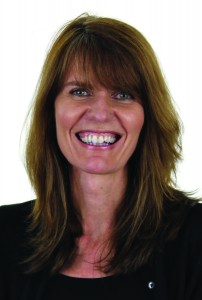
Ruth Burgner
By Ruth Burgner-
Those of us in the missionary community get to hear stories of extraordinary fruitfulness. For example, a TMS Global missionary family serving for the past 16 years in Peru recently reported that more than 8,200 people in 13 states in Peru are being discipled. This all started in 2006 with only three small groups meeting in this family’s house.
But as you know, in ministry there are other smaller, quieter happenings. These might go untold because they might seem to us too unremarkable or too unfinished to seem worthy to mention. They might be the planting parts, not the harvesting parts. They might be the details of the times when nothing, or only the most miniscule thing, appears to be happening. I sometimes wonder if missionaries – and all of us – hesitate to tell those bits. After all, says author and spiritual director Mark Yaconelli (Nomad, podcast 114), most people don’t tell our story until there is a happy ending. Is it okay to testify about the middle parts, even before we know how it all turns out, even before everything seems resolved?
Recently, I heard the telling of a “middle part.” One of our missionaries, Sue Fuller, who has served for the last 22 years among orphans in the Russian Far East, recalled events of a particular week. She and her-then roommate, Ari (who now serves on the home office staff), had enjoyed a day with the girls of the orphanage. They decided they would also plan a fun event for the boys. Planning for boys, though, seemed less intuitive. So they did what they knew to do. They planned food (always a winner) and karaoke (which is apparently big in Russia). The event all went well enough, although pretty low-frills in their eyes. They just hoped the orphan boys felt loved and had a good time.
But then days later, Sue overheard one of the boys talking about it to a friend. He told details about every single thing he ate and every song they played. And then this young orphan boy told his friend, “It was the best day of my whole life.”
From this account, we don’t know what happens next in the life of this young orphan, for whom one karaoke-and-snacks event was his all-time highlight. Even so, the graces in this story stand out like the colors of a sunrise. I love that Sue took note of them.
Pay attention to the graces; hunt for them, our TMS President Max Wilkins told the audience of a recent event. “Heaven and earth are full of the glory of God. …We train our missionaries to go as ‘glory sighters.’” And our missionaries are some of the best “glory sighters” I know. Eagerly, they spy out the signs of God’s activity, even in the seemingly bleakest settings.
For example, Kathleen,* a TMS Global missionary and nurse, was working in a hospital in one of the most difficult areas in Southeast Asia. When she was asked why she stayed, here is how she answered: “Why do I stay in this sweltering, filthy, difficult place? It’s not as hard a question to answer as some might think. Jesus is here in this place. I see Him all around me. I see Him in the gentle touch of the nursery staff as they attempt to care for too-small, too-weak infants who are often lying three to a crib. I see Him in the sorrow on a father’s face as he sits at the bedside of his child slowly squeezing an ambu bag because there are no more ventilators available. I feel Him with every new experience, every new story, one more baby who won’t die in a sack in a drainage ditch, one more daughter-in-law who won’t be beaten to death, one more child who won’t be sold into slavery, one more family laughing, dancing, and rejoicing in their new-found hope in a Savior called Jesus. This is a place surrounded by hardship, discouragement, struggle, and frustration. This is the Garden of Gethsemane. Jesus is sweating great drops of blood here, and I want to be with Him.”
You and I might not often see like Kathleen and Sue. It’s easy to view the world through lenses of dull gray. After all, notes Eugene Peterson, “We do not live in a world that promotes or encourages wonder.” And yet into this world the kingdom of God has come. The crucified Christ is risen. The whole earth is full of His glory. Like these missionaries, we can learn to see with new eyes. We can develop a disposition of awe. We can learn to “rejoice in the Lord always” (Philippians 4:4). “We have to cultivate responses of awed reverence,” says Peterson, “or risk missing the very heart of what is going on.”
Ruth A. Burgner is the senior director of communications for TMS Global – www.tmsglobal.org. *A pseudonym.










 As a poetic artist, Lecrae makes a distinction between a “Pastor Rapper” and that of a “lamenter” – a passionate expression of grief or sorrow that is an outgrowth of his youth and the abandonment he felt. When he was free from trying to preach like a “Pastor Rapper,” Lecrae felt the words and rhythms flow when he allowed himself to be vulnerable and honest about his own battles.
As a poetic artist, Lecrae makes a distinction between a “Pastor Rapper” and that of a “lamenter” – a passionate expression of grief or sorrow that is an outgrowth of his youth and the abandonment he felt. When he was free from trying to preach like a “Pastor Rapper,” Lecrae felt the words and rhythms flow when he allowed himself to be vulnerable and honest about his own battles. 
 “Anyone who knows my story would expect this book to ooze with justice issues. After all, the pain caused by injustice has motivated me to spend a lifetime working for social change on behalf of widows, prisoners, the poor, and anyone who struggles,” writes Perkins, the civil rights veteran who has led the Voice of Calvary Ministries in Jackson, Mississippi, since 1975. “So how did someone who has experienced the anguish of poverty, racism, and oppression end up wanting to write a book about love as his climactic message? Good question… I’ve come to understand that true justice is wrapped up in love. God loves justice and wants His people to seek justice (Psalms 11 and Micah 6:8). But I’ve come to understand that true justice is wrapped up in love. The old-time preacher and prophet A.W. Tozer had a way of making the most profound truths simple and palatable. He once said, ‘God is love, and just as God is love, God is justice.’ That’s it! God’s love and justice come together in the redemptive work of Jesus Christ, and we can’t be about one and not the other. They’re inextricably connected.”
“Anyone who knows my story would expect this book to ooze with justice issues. After all, the pain caused by injustice has motivated me to spend a lifetime working for social change on behalf of widows, prisoners, the poor, and anyone who struggles,” writes Perkins, the civil rights veteran who has led the Voice of Calvary Ministries in Jackson, Mississippi, since 1975. “So how did someone who has experienced the anguish of poverty, racism, and oppression end up wanting to write a book about love as his climactic message? Good question… I’ve come to understand that true justice is wrapped up in love. God loves justice and wants His people to seek justice (Psalms 11 and Micah 6:8). But I’ve come to understand that true justice is wrapped up in love. The old-time preacher and prophet A.W. Tozer had a way of making the most profound truths simple and palatable. He once said, ‘God is love, and just as God is love, God is justice.’ That’s it! God’s love and justice come together in the redemptive work of Jesus Christ, and we can’t be about one and not the other. They’re inextricably connected.”


